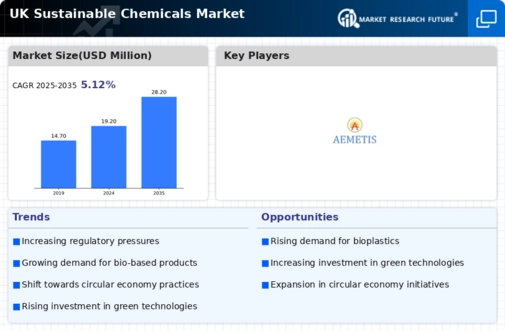Market Trends
Key Emerging Trends in the UK Sustainable Chemicals Market
In recent years, the UK Sustainable Chemicals Market has shown significant changes that demonstrate a commitment towards environmentally friendly and socially responsible behavior among chemical companies. In response to global attention on sustainability as a priority area in businesses today, the UK market has been working out ways to include eco-friendly solutions into its products. The rising demand for bio-based chemicals produced from biomass, agriculture, or residues is one example of such a trend. Similarly, tough ecological laws and higher concentration on climate change have led to the adoption of sustainable methods by chemical industry players in the UK. Companies such as Clariant conduct their research on innovative low-impact processes and products that will be less harmful to both the environment and people while complying with environmental regulations. The concept behind circularity is minimizing waste generation, maximizing recycling, and reusing resources, among others. Manufacturing companies are increasingly focusing on product designs that enhance recyclability so that there is little environmental effect during the production stage. Production chains within this industry are being established between partners who share common goals regarding sustainability in order to facilitate sharing knowledge like best practices. This collaboration will also ensure that the value chains are comprehensive enough to include all sectors of the industry, from procurement, production, and even waste management, in order to make it more sustainable. Thus, through mobilizing collective efforts, a much better ecosystem can be created within this particular sector. The shift towards green chemistry is happening in the UK Sustainable Chemicals market. Green chemistry focuses on products and processes that avoid harmful substances, reduce energy consumption, and minimize waste generation. This method is fully aligned with environmental and economic goals since it allows for increasing effectiveness while reducing the ecological footprint of chemical manufacturing. Finally, changing consumer preferences coupled with market dynamics have influenced product innovation in the UK Sustainable Chemicals Market. As people become more careful about their choices, which affect the environment today, they tend to prefer products that are eco-friendly or have been developed using sustainable methods. A change in the way customers behave prompts companies to invest considerable amounts of money into developing greener alternatives, thereby enabling them to communicate their achievements clearly regarding sustainability, which should ultimately boost their business performance and profile.






Leave a Comment